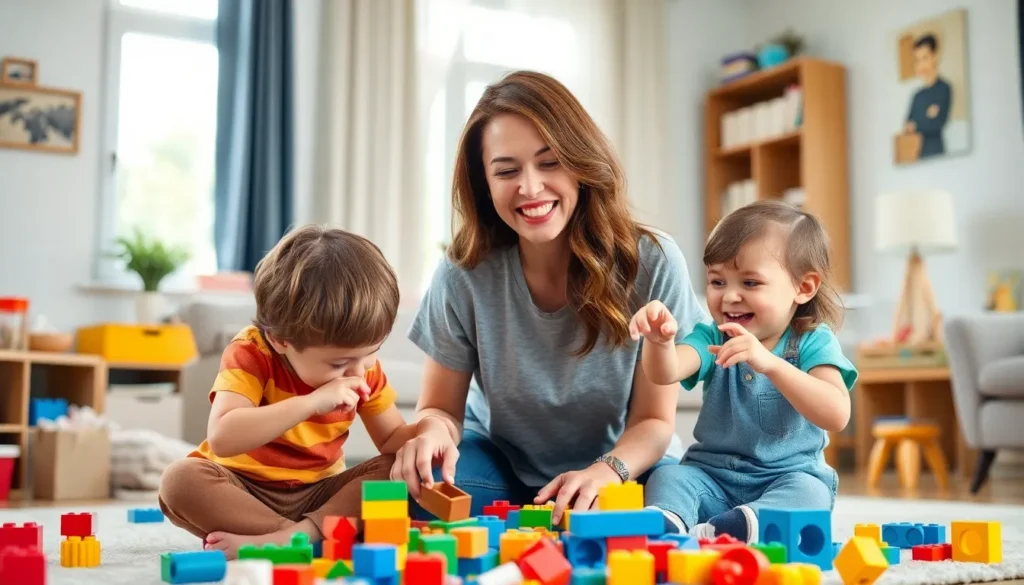Parenting isn’t for the faint of heart. It’s a wild ride filled with unexpected twists and turns, and sometimes, things go hilariously wrong. From epic meltdowns over broccoli to miscommunication that leads to a toddler’s fashion statement involving mismatched shoes and a superhero cape, these parenting fails are the stuff of legend.
Every parent has a story that makes them cringe and laugh at the same time. These moments remind us that perfection is overrated and that parenting is more about survival than a flawless execution. So grab a cup of coffee (or a glass of wine) and prepare to revel in the delightful chaos of parenting fails that prove we’re all just winging it in this crazy journey called parenthood.
Parenting Fails
Parents frequently encounter moments that lead to mishaps and challenges. Acknowledging these common issues sheds light on the unpredictability of raising children.
Lack of Communication
Miscommunication often leads to misunderstandings between parents and children. Consistent conversations about feelings, rules, and daily activities prevent confusion and foster trust. Ignoring this communication can create tension and uncertainty, which may result in tantrums or defiance. Keeping lines open allows both parties to express thoughts and feelings. Encouraging regular dialogue helps children understand expectations and builds a sense of security. Parents should actively listen to their children’s concerns to validate their emotions and strengthen their bond.
Inconsistent Discipline
Inconsistent discipline creates confusion for children regarding acceptable behavior. Setting clear rules and maintaining them ensures children understand boundaries. Failing to enforce these guidelines may lead to testing limits, resulting in frustration for both parties. Establishing consequences for specific behaviors allows children to learn accountability. Following through with discipline helps children gauge what actions lead to repercussions. Parents should collaborate as a team, aligning their approaches and strategies for consistent enforcement and effective outcomes.
The Impact of Parenting Fails

Parenting fails shape children’s emotional well-being and can lead to significant long-term outcomes. Recognizing their effects is essential for nurturing healthier relationships.
Emotional Effects on Children
Emotional turmoil often arises from parenting fails. Inconsistent discipline can create confusion, leading children to feel insecure about their place within the family. Miscommunications foster mistrust, which may distance parents from their children. Fear of judgment can prevent kids from expressing their feelings. Anxiety often escalates when children become uncertain about expectations. Supportive environments cultivate resilience, while chaotic homes may undermine children’s confidence. Establishing open communication alleviates misunderstandings and builds trust.
Long-Term Consequences
Long-term effects of parenting fails manifest in various ways. Confused children may struggle with self-esteem issues that persist into adulthood. Inconsistent discipline can lead to rebellious behavior, making it difficult for them to comply with rules in various environments. Emotional scars from negative experiences might result in anxiety disorders or difficulties in forming healthy relationships. Poor communication skills often emerge, impacting their interactions in friendships and professional settings. Instilling strong values through consistent parenting proves essential for fostering well-adjusted individuals.
Learning from Parenting Fails
Parents often encounter moments that spark reflection and growth. Recognizing these moments can foster an environment of learning and improvement.
Recognizing Mistakes
Identifying mistakes is crucial in parenting. Parents frequently overlook communication breakdowns, leading to misunderstandings. This awareness encourages them to evaluate their interactions with children. Inconsistent discipline often leads to confusion about rules and expectations. Acknowledging these missteps can pave the way for constructive discussions that enhance understanding. Parents might also notice how their reactions influence children’s emotional responses, fostering an atmosphere of security. Spotting these areas of improvement helps in creating a more harmonious family environment.
Implementing Positive Changes
Implementing positive changes requires commitment and collaboration. Establishing open lines of communication is a pivotal first step. Parents can initiate discussions to set clear, consistent rules, ensuring everyone understands expectations. Teamwork fosters a unified approach to discipline, reducing confusion among children. Adapting techniques like active listening can significantly enhance interactions with kids. Utilizing positive reinforcement helps children grasp desired behaviors more effectively. Moreover, reflecting on parenting styles encourages adaptation and growth. Prioritizing these changes can nurture emotional resilience and improve family dynamics over time.
Tips to Avoid Parenting Fails
Addressing communication and consistency enhances parenting effectiveness. The following strategies pave the way for improved interactions and a more stable environment for children.
Effective Communication Strategies
Utilizing active listening techniques fosters mutual understanding. Parents should prioritize open dialogue, encouraging children to express their feelings. Asking open-ended questions guides meaningful conversations. Regular family meetings help in establishing a routine for discussions. Ensuring clarity in language minimizes misunderstandings. Expressing emotions empathetically cultivates trust, allowing children to feel heard. Reinforcing positive behavior through acknowledgment strengthens the parent-child bond. Adapting the tone and volume based on the situation aids in conveying messages more effectively. Emphasizing shared stories fosters a supportive atmosphere, where everyone feels valued.
Consistent Parenting Approaches
Setting clear expectations plays a crucial role in effective parenting. Parents can create a unified front by collaborating on rules and consequences. Consistency in discipline teaches children the importance of accountability. Understanding individual needs of each child permits tailored approaches. Reinforcing age-appropriate consequences ensures fairness and clarity. Utilizing a rewards system encourages positive behavior through recognition. Established routines provide children with a sense of security and predictability. Regularly reviewing guidelines strengthens mutual understanding. Aligning parenting styles promotes a harmonious family dynamic.
Conclusion
Parenting is a journey filled with ups and downs. Embracing the chaos and learning from mishaps can lead to personal growth for both parents and children. Recognizing that nobody’s perfect allows families to bond over shared experiences and laughter.
By focusing on open communication and consistent discipline, parents can create a nurturing environment that fosters resilience and confidence in their children. Each parenting fail offers a chance to reflect and improve, ultimately strengthening family ties. It’s all part of the beautiful adventure of parenthood.



